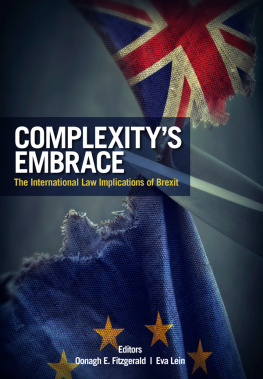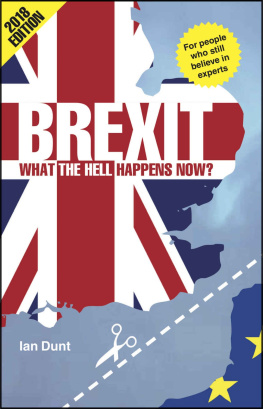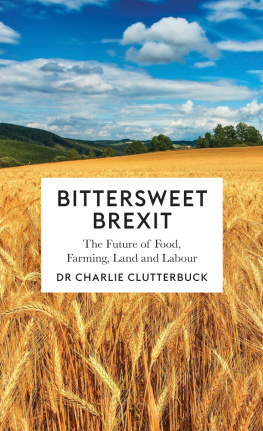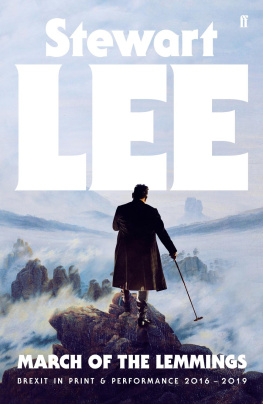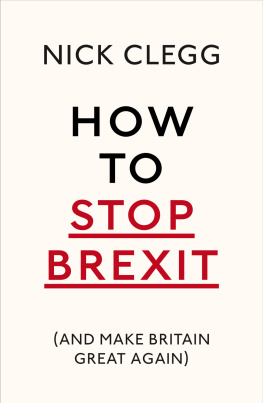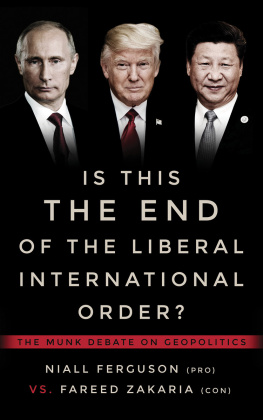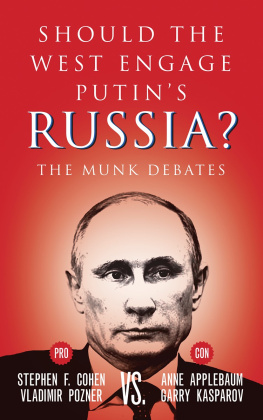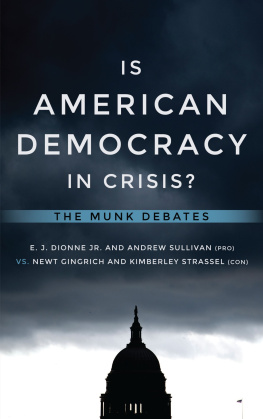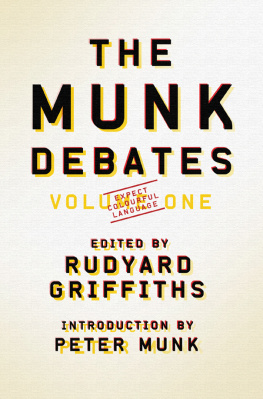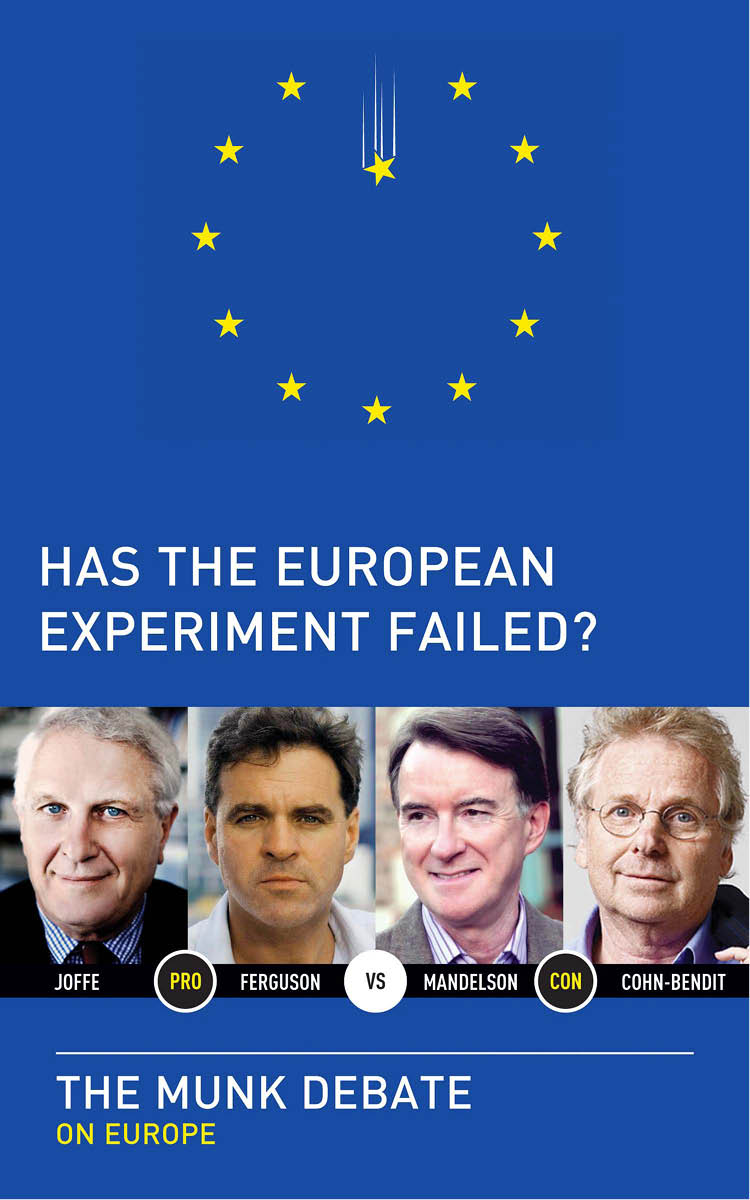HAS THE EUPROPEAN EXPERIMENT FAILED?
FERGUSON AND JOFFE VS.
MANDELSON AND COHN-BENDIT
THE MUNK DEBATE ON EUROPE
Edited by Rudyard Griffiths
Copyright 2012 Aurea Foundation
Niall Ferguson in Conversation, by Sonia Verma. Copyright 2012, Globe and Mail
Peter Mandelson in Conversation, by Sonia Verma. Copyright 2012, Globe and Mail
All rights reserved. No part of this publication may be reproduced or transmitted in any form or by any means, electronic or mechanical, including photocopying, recording, or any information storage and retrieval system, without permission in writing from the publisher.
Distribution of this electronic edition via the Internet or any other means without the permission of the publisher is illegal. Please do not participate in electronic piracy of copyrighted material; purchase only authorized electronic editions. We appreciate your support of the authors rights.
This edition published in 2012 by
House of Anansi Press Inc.
110 Spadina Avenue, Suite 801
Toronto, ON, M5V 2K4
Tel. 416-363-4343
Fax 416-363-1017
www.houseofanansi.com
The transcript of this debate seeks to be as close to a verbatim account of its proceedings as possible. Every reasonable effort has been made to verify the accuracy of the facts and statistics presented in this debate.
Library and Archives Canada Cataloguing in Publication
Has the European experiment failed? : the Munk debate
on Europe / Daniel Cohn-Bendit... [et al.] ; edited by Rudyard
Griffiths.
(The Munk debates)
Issued also in print format.
ISBN 978-1-77089-229-3
1. European Union History. I. Cohn-Bendit,
Daniel II. Griffiths, Rudyard III. Series: Munk debates
JN30.H373 2012 341.2422 C2012-902575-5
Library of Congress Control Number: 2012937622
Cover design: Alysia Shewchuk
Cover artwork: Dragonfly Design Communications
Cover Photographs: Joffe Vera Tammen; Ferguson Dewald Aukema; Mandelson Peter Mandelson; Cohn-Bendit Joelle Dolle
Transcription: Rondi Adamson
We acknowledge for their financial support of our publishing program the Canada Council for the Arts, the Ontario Arts Council, and the Government of Canada through the Canada Book Fund.
INTRODUCTION BY PETER MUNK
The crisis facing Europe is clear. For going on a generation, the majority of the national governments in the eurozone have spent more than they take in. The result is rapidly increasing debt and corresponding servicing costs as countries deficits rise faster than their economies are expected to grow. This dangerous dynamic, and its pernicious social consequences, is nowhere more evident than in Greece, where the national public debt is fast approaching 200 percent of GDP. Taken as a whole, the eurozone currently has 1.1 trillion euros in debts due in 2012. And we must view these debts collectively, since the economic and political covenants of the European Union make it impossible for any individual country to restructure its debt unilaterally and still remain in the euro.
What lies at the core of the EU breakdown, and what we are witnessing, is the historic recalibration of the role of the modern state in real time. If the 2008 financial crisis showed us the failures inherent in the U.S. capital market model, the eurozone crisis is demonstrating the limits of the highly leveraged social welfare state. Through both crises, citizens of North America and Europe are struggling to reimagine what their governments can and should be. How much power should they have? How much money should they spend? And how should we draw the lines of accountability between citizens, the state, elected officials, and increasingly powerful transnational institutions? To top it off, this is all happening during a period of growing political uncertainty and unrest.
These issues formed the background for the ninth semi-annual Munk Debate, held at Roy Thomson Hall in Toronto, on Friday, May 25, 2012, before an audience of 2,700 and with over 3,000 people watching online. The resolution for the evening, be it resolved the European experiment has failed, fostered our most spirited, and dare I say emotional, debate to date. Our debaters are each deeply invested in the still uncertain fate of the European project, which brought immediate consequence to the nights discussion.
Four exceptional debaters were assembled to tackle this critical issue. Arguing for the resolution were economic historian Niall Ferguson and German editor-publisher Josef Joffe. Arguing against the motion were EU parliamentarian Daniel Cohn-Bendit and former EU commissioner Lord Peter Mandelson.
Niall Ferguson is a celebrated Harvard professor of history, a Daily Beast/Newsweek columnist, and the author of numerous international bestselling books, including The Ascent of Money: A Financial History of the World and Civilization: The West and the Rest . For more than ten years, Ferguson argued, it has been the case that Europe has conducted an experiment in the impossible. A monetary union without labour market integration and without any fiscal federalism was bound to blow up. And the proof, said Ferguson, is in both the economic stagnation of the union and also in its geopolitical insignificance.
Debating with Niall Ferguson was Josef Joffe, the publisher of the prestigious German weekly Die Zeit . He is the author of numerous bestselling books on global politics, including berpower: The Imperial Temptation of America . Europe has transcended a thousand years of war, Joffe argued, but twenty-seven nation-states will never grow into one. Europe is crumbling before our eyes, and its proudest achievement the euro is going to bury the union. In the end, Europe is broke, and Germany neither wants to, nor can afford to, pay for the rest. We must now hope, Joffe concluded, that the collapse of the economic union will not bring down European political ties.
Daniel Cohn-Bendit, who argued against the resolution, emerged on the European scene in the 1960s as a key leader of the student revolts in France. Half a century later, he remains fondly known as Danny the Red, and serves as co-president of the Greens/European Free Alliance Group in the European Parliament. He also sits on the EU parliamentary committees for Economic and Monetary Affairs and Constitutional Affairs. In the past, Cohn-Bendit has argued passionately that we need a true democratic process for the renewal of Europe, in which the European Parliament plays a central role. The centrality of the democratic process must be seen in tandem with the EUs true political successes. Cohn-Bendit reminded us that this is a union born out of what was once the most murderous region in the world, and as a result, Europe is an objective that we must not disavow, despite the challenges of economic union.
Our final debater was Lord Peter Mandelson. Lord Mandelson has held numerous senior cabinet positions in the United Kingdom as a Labour MP under prime ministers Tony Blair and Gordon Brown. He was Great Britains EU commissioner from 2004 to 2008, and is currently the chairman of Global Counsel, an international strategic advisory firm. Mandelson urged the audience to measure the European Union against a longer history and a bigger aim. While the euro is certainly in trouble, he argued, the eurozone is not the whole European project. The EU is based on a political idea that a group of once antagonistic countries can be more than the sum of its parts. It is this supranationalism that must remain the focus of our steady hand and be the topic of debate.


